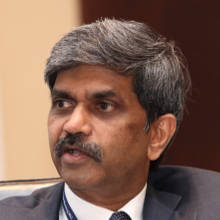[Photo by freestocks on Unsplash]
2020 can be defined as a pandemic year, a US Presidential race year and a year when the world took a pause. There were six or more books on the American Presidency in 2020! My list for 2020 has books on the US presidency, on people and on life after the pandemic. I hope you enjoy the 10 books. I have deliberately not included the five outstanding summer books I recommended in 2020.
1. A Promised land by Barack Obama
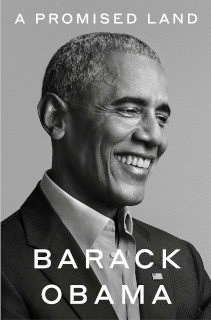
I picked this book for this list because it is one of the most authentic books on leadership that one can read, about leadership and the difficulties in getting alignment at every level. It is a fairytale book, the story of a junior Illinois senator who within eight years saw Al Gore accept the nomination from an airport in 2000, delivered a stirring ‘We are the United States of America, we are not the blue states or the red states’ endorsement speech for John Kerry in 2004 and was the Democratic presidential candidate in 2008. Obama outlines his struggles with his habits, his work ethic and his family in this memoir. I think Obama traces all his signature strengths and challenges candidly in this book, which is rare from a leader of that stature. If I had to find fault, it is too long, all of 899 pages—and part 2 is on its way.
2. Lights Out by Ted Mann and Thomas Gryta
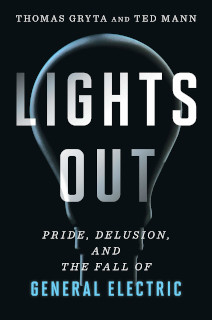
This is a book from two Wall Street Journal journalists, on how GE went from being an iconic, most admired company to obscurity in a very short span. I have read every book about GE and in a way, I think GE led management thinking and practice for a long time in the 1990s. GE was the gold standard! The book says that CEO Jeff Immelt’s biggest challenge was to step out of his predecessor Jack Welch’s shadow and that led to a lot of problems. History will judge if this is true or false. The book traces the problems of GE to GE Capital (a black box), its rigid hierarchical culture and a place where telling truth to the boss wasn’t encouraged as bad news became the daily diet. This analysis just tells you that you need leaders who think of the institution ahead of their personal glory and lip service and slogans do not make an effective winning culture.
3. 10 Lessons for a Post-Pandemic World by Fareed Zakaria
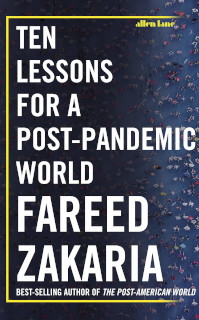
Fareed Zakaria is the CNN host of GPS (Global Public Square). Zakaria calls the pandemic the third most consequential event after 9/11 and the 2008 global financial crisis. He sees the pandemic as a large systemic failure. He feels the world has been in denial for a long time. We have taken to bashing the government and want a smaller role for governments in our lives. However, things like the pandemic require governments to step up and deliver. When a government is not involved, few resources are allocated to pressing issues. Zakaria also believes that in a crisis, leaders who are realists but idealists make the right combination. He gives the example of FDR, Truman, and Eisenhower.
4. A World Without Work by Daniel Susskind
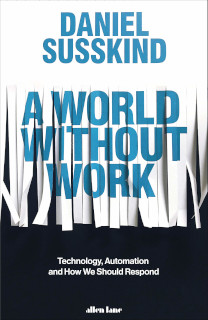
Daniel Susskind is an economist from Balliol College, Oxford. John Maynard Keynes coined the expression ‘technology unemployment’ in 1930. His prophetic label might come true by 2030, a hundred years later. When will machines replace the average worker? That has been a debate for the last century. Machines tend to replace standardized, repetitive work. We live with a paradox at work. Hard work has become a religion, yet engagement and job satisfaction at work are not where they need to be. We are in a world of job unhappiness, low wage growth and rising debt. Susskind feels that some form of Universal Basic Income is needed because work is a social, economic and a psychological issue now. We have designed work policies but need to start thinking of leisure policies as we discuss concepts like a four-day week.
5. Sizing People Up by Cameron Stauth and Robin Dreeke
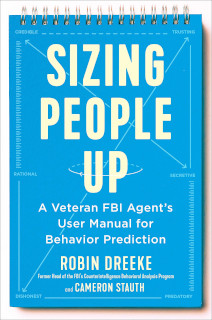
This is a book by an FBI agent, Robin Dreeke, who thought about this after 9/11 when he had to work with some Russian agents and also navigate the politics at the FBI. The authors argue that it is important to read people well in order to succeed. Reading people is about arriving at mutual goals, the longevity of relationships, the reliability of relationships, commitment to action, open communication and stability. The authors point out that anything to do with reliability, credibility and trustworthiness starts with you. You have a good chance of being seen as trustworthy if you are trusting yourself. A good way to build trust with people is to keep your ego in the background and be open minded.
6. Rage by Bob Woodward

Bob Woodward is the sage of presidential memoirs. He has written about 13 presidencies so far and all 13 are bestsellers. In writing this book about President Trump, Woodward had full access to Trump and all his aides. Woodward recorded every conversation with Trump. He gives the reader a great insight into how Trump deliberates, executes and decides. Trump was hoping against hope that Woodward would write a positive book about him. The book traces a lot of important milestones like the Trump – Kim Jong-Un meeting (Woodward had access to 25 letters between the two leaders), and ends with the Trump response to the pandemic. The book is meticulously researched—a Woodward hallmark—and Woodward takes us through the Trump thesis on national security, geopolitics and the Democrats. He describes the decision making in the Trump White House in great detail (chaotic, unruly, whimsical) and finally concludes that “Trump is unfit to govern USA”.
7. Upstream: How to Solve Problems Before They Happen by Dan Heath
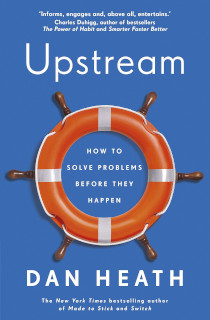
Dan Heath is a fellow at Duke University. This book is about complex system interaction, like a business, a city, etc. It is about an everyday issue—problems—how to recognize them and how to deal with them before they happened. What if we could stop crimes before they happened? What if we could stop accidents before they happened? We tend to stumble on problems, stumble on answers and never really learn about them properly or don’t weed them out at the root. Heath puts the issues onto two large buckets – the first being our inability to recognize a problem, and a lack of problem ownership and tunneled vision. In the second bucket he dwells on how to find the right people who unite people, changing the rules that create the problem, what is the point of leverage, what are the early warning signals, i.e. how do we look for data patterns that lead to a problem and finally how do you know you are succeeding in solving a problem.
8. Expert: Understanding the Path to Mastery by Roger Kneebone

Roger Kneebone is a doctor and a professor at Imperial College London, and has studied mastery. Many label him the expert of expertise. He starts by saying that becoming an expert is a basic human characteristic. There is no doubt we need experts and every professional wants to be seen as an expert in his/her field. The journey to expertise starts with being an apprentice, graduating to a journeyman, then taking responsibility and then becoming an expert and passing the craft and knowledge to future generations. He explores the characteristics in each stage. Kneebone makes an interesting observation in the book: while the outcome is different in every field, the journey to expertise is the same. We need experts to make sense of what we don’t know, to help us when things have gone wrong.
9. Uncharted: How to Map the Future Together by Margaret Heffernan
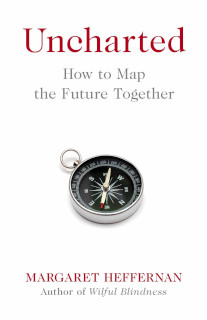
Margaret Heffernan is a former CEO and a popular TED Speaker. Heffernan says that we are all addicted to perfection and we want to know what will happen next with a degree of certainty. We want to face the future with some degree of confidence. She argues that life is never so easy and even the experts in forecasting do not predict more than 400 days out. She argues that in complex situations, being efficient is a problem, being robust is a better answer. She argues that being prepared or preparedness today is doing everything
today that you might need for tomorrow. She goes through many examples from history, business and science to build her logic. The answer to things lies in creativity and humanity and not in technology. Technology, she argues, takes life out of life. Uncertainty is an opportunity and not a problem. Uncertainty gives us the freedom to try something. So, get comfortable with uncertainty.
10. The Wakeup Call by John Micklethwait and Adrian Wooldridge
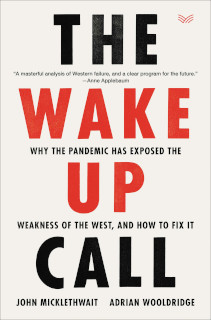
John Micklethwait is from Bloomberg News and previously The Economist; Adrian Wooldridge is from The Economist. They are among the best placed to write this book. This book argues that the West has managed the pandemic far worse than the East. The pandemic taught us how important government was. Some good governments did well, some didn’t—this was the difference between living and dying. The authors believe that lack of investment in a state is an important variable. They do an interesting exercise of taking a combination of William Gladstone and Abraham Lincoln, two leaders they thought reshaped government in their times. They then look at what’s worked around the world in the pandemic and then try and apply it to the US via this new combination leader. They believe the South East Asia model is a good one and argue how one could get the best talent to be public servants a la Singapore. They feel that 40% of computer systems in the US are legacy systems and need to be upgraded. They feel that the Western ideology built on the concept of individual freedom and human rights, with lower investment in government might not be a model to tackle challenges like the pandemic.
Join us for a special learning session
We would also like to take this opportunity to invite you to a special learning session, “The Best Business Books of 2020” with D Shivakumar, President (Corporate Strategy and Business Development) at Aditya Birla Group and R Sriram, Co-Founder, Next Practice Retail.
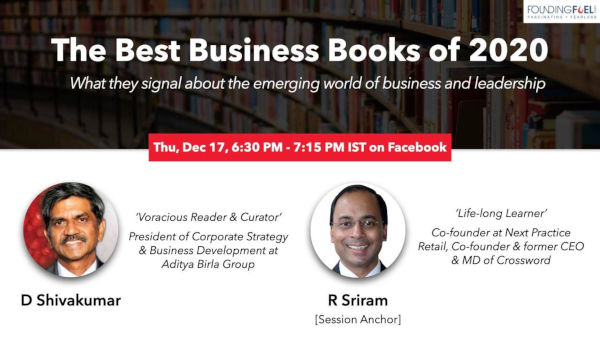
Shivakumar, or Shiv, as he is known, has a strong fan following in our Founding Fuel community, for his book recommendations that give readers a headstart to the emerging trends in management, strategy, innovation, entrepreneurship and leadership.
In this special conversation with Sriram, Shiv will discuss what’s different about this year’s selection. He will also share some of his superpower secrets about how he is able to nurture the discipline to read in the midst of a busy professional life.
You can register for the event here: https://bit.ly/Books2020FF
Still curious?
Read Shiv’s books recommendations:
- Five summer business books (2020)
- Three great books on handling uncertainty (2020)
- Ten best business books of 2019
- Five books on the surprising traits of best employees & leaders (2019)
- Top 10 Business Books of 2018
Note: Founding Fuel may earn commissions for purchases made through the Amazon links in this article.

